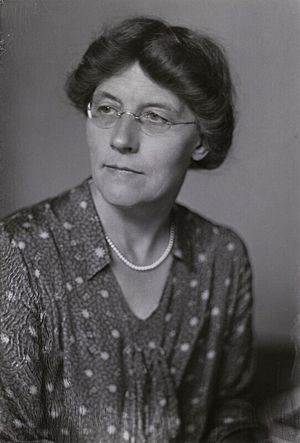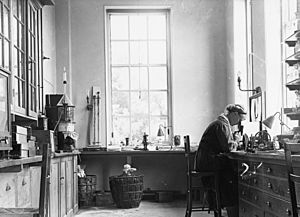Winifred Brenchley facts for kids
Winifred Elsie Brenchley (1883–1953) was an important British scientist. She was an agricultural botanist, which means she studied plants grown for food. She worked at the Rothamsted Research Station.
Winifred Brenchley helped discover that a tiny amount of boron is vital for plants to grow well. She was also the first woman in the UK to become a leader in agricultural science, a field mostly run by men at the time. People often say she was the top expert on weeds in Britain in the early 1900s.
Contents
Early Life and Learning
Winifred Brenchley was born in London on August 10, 1883. Her father, William Brenchley, was a schoolmaster and even a mayor. When she was a child, she had measles, which made her partly deaf.
She went to James Allen's Girls' School in London. One of her teachers there was a famous plant scientist named Dr. Lilian Clarke.
Winifred then studied at Swanley Horticultural College for two years, finishing in 1903. This college taught new science-based ways of gardening and farming. It helped women get jobs in these areas, which were usually only for men. By 1903, the college only accepted women.
Winifred won a special medal from the Royal Horticultural Society. But she decided to focus on studying plants more deeply, rather than just gardening. She earned her first science degree from University College London in 1905. She continued her studies and received a higher science degree (DSc) in 1911. Her research was about how strong wheat grains are.
A Career in Science
After her studies, Winifred went to work at Rothamsted Experimental Station in Harpenden. She was the very first woman to work in their labs in 60 years! At first, she was hired because they didn't have enough money to attract a man for the job.
Winifred was the only woman among many male scientists. They even started a tradition of afternoon tea, thinking it was proper for her. This tea tradition, and a later woman scientist named Muriel Bristol, actually inspired a famous study by R.A. Fisher about experiments.
Winifred's excellent work quickly became clear. After just one year, she became a permanent employee and the head of the Botany Department. She led this department until she retired at age 65.
Important Discoveries
Early in her time at Rothamsted, Winifred showed how skilled she was. She made better ways to grow plants in water, which helped scientists study them. She also came very close to finding out that copper and zinc are important for plants. She wrote about this in her book, Inorganic Plant Poisons and Stimulants (1914).
One of the most famous discoveries from her lab was made by Katherine Warington in 1923. Katherine found that boron is a micronutrient for plants. This means plants need only a tiny amount of it to be healthy. Winifred's lab then did more research on how boron affects plants.
Winifred was also very interested in how weeds grow. In her book Weeds of Farmland (1920), she created the first full scientific study of weeds in the UK. She also studied the long-term Park Grass plots at Rothamsted. This led to another book, Manuring of Grass Land for Hay (1924). It explained how adding lime and fertilizers changes the types of plants growing in grasslands.
Awards and Recognition
Winifred Brenchley was recognized for her important work.
- In 1910, she became a Fellow of the Linnean Society of London, a group for natural scientists.
- In 1920, she became a Fellow of the Royal Entomological Society, which is for insect scientists.
- She worked closely with A. D. Imms, an insect expert, and collected insects with him. She was especially interested in Lepidoptera, which are butterflies and moths.
- In 1948, the year she retired, she was given the OBE award. This is a special honor from the British government.
Later Life
After retiring, Winifred Brenchley went back to enjoying gardening. She was also working on putting together all the notes from her research. Sadly, she had a serious stroke and passed away in Harpenden on October 27, 1953.
See also
 In Spanish: Winifred Brenchley para niños
In Spanish: Winifred Brenchley para niños
 | Jackie Robinson |
 | Jack Johnson |
 | Althea Gibson |
 | Arthur Ashe |
 | Muhammad Ali |



